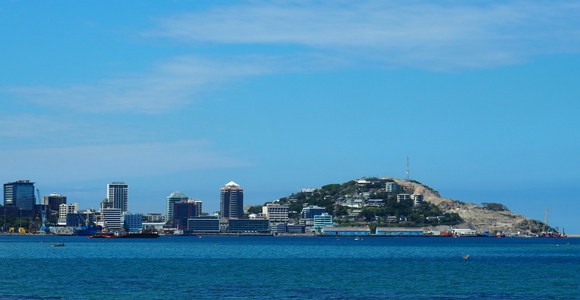The Papua New Guinea Government has released its 2016 Supplementary Budget to adjust to ‘tough’ economic conditions. It assumes lower economic growth, a weaker exchange rate and higher inflation and analysts are posing questions.
The Papua New Guinea Government has released its 2016 Supplementary Budget to adjust to ‘tough’ economic conditions. It assumes lower economic growth, a weaker exchange rate and higher inflation and analysts are posing questions.The PNG Treasurer Patrick Pruaitch said in his speech to the Parliament last week that GDP growth for 2016 had been revised down from the Budget projection of 4.3 per cent to 2.2 per cent. Non-mining growth is also expected to weaken from 3.2 per cent to 2.6 per cent.

Treasurer Patrick Pruaitch
The lower growth forecasts are attributed to ‘time lag effects’ from drought and frost in the agriculture sector and ‘low commodity prices and foreign exchange shortages’.
Pruaitch pointed to mining and quarrying, manufacturing and the wholesale and retail trade sectors as notably experiencing slowdowns.
He said conditions are expected to ease, however, with foreign exchange becoming more available because of the re-opening of the Ok Tedi mine and ‘the drawdown of the Credit Suisse first tranche of US$200 million syndicated loan facility in early August.’
The Treasurer also signalled likely falls in the currency. He said the kina is forecast to weaken against the US dollar by 9.1 per cent and the Australian dollar by 12.6 per cent.
‘The Bank of Papua New Guinea has to act quickly in letting the kina depreciate.’
The weaker currency is expected to affect inflation, which is anticipated to rise from 5.7 per cent to 6.6 per cent.
Options
The budget objectives of increasing dividends from state-owned enterprises and cutting funding to government agencies were largely predictable and reflect what are essentially PNG’s only short-term options to respond to budget crises such as this, Deloitte Office Managing Partner, Helen Hamilton-James, tells Business Advantage PNG.
But she expresses concerns on the effectiveness of such measures.
‘In a fiscally constrained environment it will be difficult to get much more out of the SOEs without drilling down into how they operate and how they are structured.
‘Supplementary budgets are becoming a regular feature of the fiscal calendar, and this highlights the importance of continuing to develop PNG’s public and private sector institutions, as well as deepening alternative industries such as tourism, agriculture or services.’
‘A sharp drop in the value of the kina “to a stable level with a simultaneous relaxation of exchange controls” will provide a boost to exports and business confidence.’
Hamilton-James says the budget measure is crucial to address PNG’s dependence on mining and susceptibility to external shocks.
‘Positive measures aimed at enhancing private sector participation and growing the formal workforce would also be welcome additions to future budgets.’
Kina

UNSW’s Satish Chand
Professor of Finance in the School of Business at the University of New South Wales, Satish Chand, describes the weakening of the kina as ‘long overdue’.
He says a sharp drop in the value of the kina ‘to a stable level with a simultaneous relaxation of exchange controls’ will provide a boost to exports and business confidence.
‘The Bank of Papua New Guinea has to act quickly in letting the kina depreciate given the announcement by the Treasurer that it will fall,’ says Chand. ‘People will be shifting money abroad to avoid losses and deferring foreign receipts.
‘I would have preferred loans from one of the International Financial Institutions.’
‘It would have been better for the Treasurer to make this announcement after the central bank had acted.’ He adds that the depreciation in the Kina will have a direct flow-on effect on inflation.
Development expenditure
Chand believes the cost of the foreign exchange loans must be significant. ‘Do we know the interest rate being charged? I would have preferred loans from one of the International Financial Institutions.’
‘The challenge will be in picking these projects right and ensuring that waste is kept to a minimum.’
He describes the focus on developmental expenditure with significant returns as a ‘positive move’, although he warns that there is a need to look into the details on how such projects are chosen.
‘Investments into public infrastructure delivering returns in excess of 20 per cent per annum could create jobs, raise GDP, and increase exports. The challenge will be in picking these projects right and ensuring that waste is kept to a minimum.’
Revenue
Chand says the details on revenue are ‘thin’. He says he is ‘not sure’ if the state-owned enterprises are highly profitable and in a position to deliver the dividends the Treasurer is anticipating.
‘An omission from the budget is election-related expenditures that have in the past been used to amass votes.’
‘The GDP estimates have been revised upwards significantly; thus the ratios in terms of the deficit and debt as proportions of GDP must be interpreted with extreme care.
‘One omission from the budget is election-related expenditures that have in the past been used to amass votes.
‘My guess is that they will be included in the 2017 Budget, but that may be a bit late given that the elections are due mid-2017.’
Repair

Economist Paul Flanagan
Economist Paul Flanagan, author of PNG Economics, argues that the supplementary budget is a ‘positive development’ that confirms ‘key ministers accept the need for Budget repair.’
But he warns that the K958 million in revenue measures ‘do not represent sustainable increases in the revenue base.’ He points to the proposed sale of shares in the PNG LNG project to landowners, which he calls a ‘capital transaction’ that ‘technically does not reduce the Budget deficit.’
Flanagan says a ‘positive’ is that maintenance expenditure is being protected. ‘It is much better to maintain roads than build new ones.’


